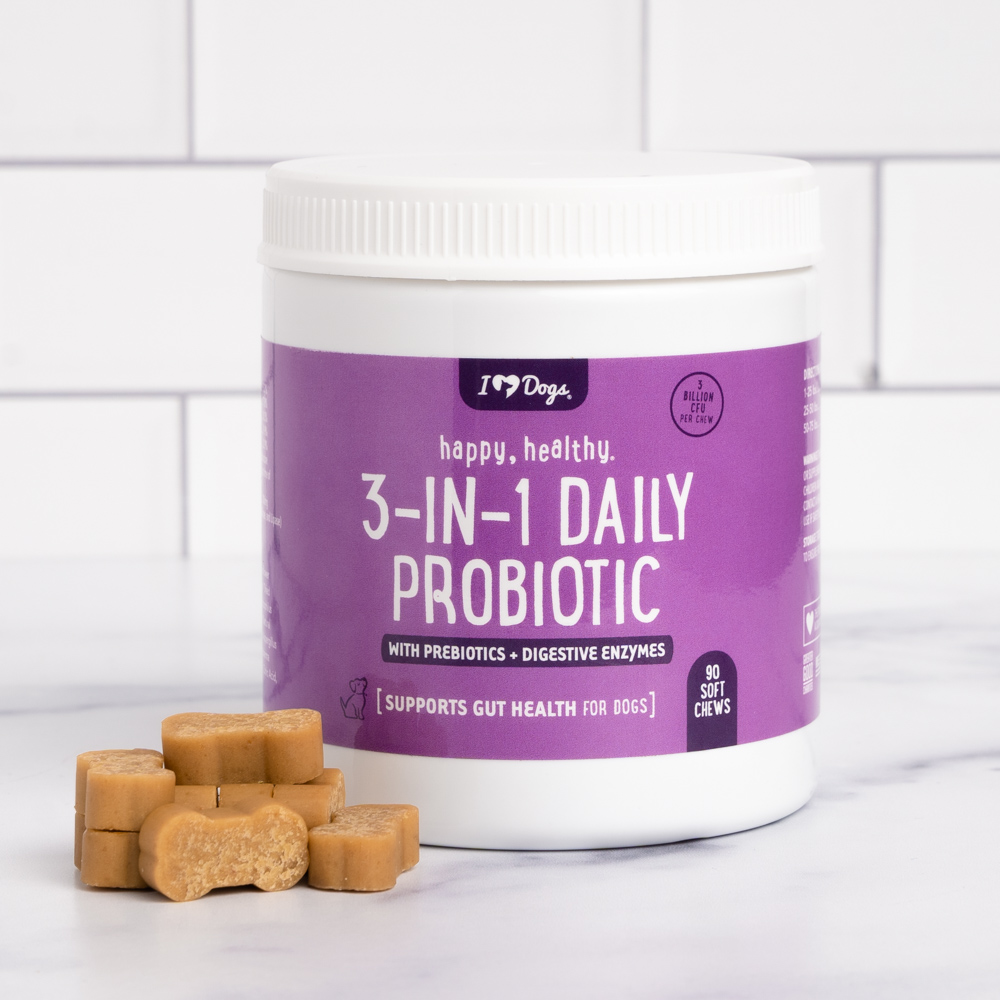Diarrhea in dogs is a symptom of a larger problem like stress, sudden diet change, food allergies, dietary indiscretion (garbage grazing), parasites, viral or bacterial illness, even chronic disease.
Although it is usually self-limiting, it’s uncomfortable for your pooch and messy for you. We’ll cover when to seek immediate veterinary care below, but in mild cases, certain home remedies may do the trick.
Dogs can’t tell us, “Hey, it’s just a stomach bug. I’ll be okay,” or “That new treat doesn’t agree with me.” So it’s up to us as pet owners to monitor them for additional symptoms that could indicate a more serious issue. When in doubt, or if your pup has any of the following symptoms, you should always seek veterinary care.
Signs That It’s Time To See A Vet For Your Dog’s Diarrhea:
- Black, tarry, or bloody stools
- Loss of appetite
- Marked lethargy
- Dehydration
- Frequent vomiting
- Abdominal pain – dogs may groan, pant, cry when touched or while defecating, seem unable to get comfortable or appear bloated
- Lasts longer than 48 hours – *sooner in puppies, tiny dogs, geriatric dogs, and those with chronic diseases
For dogs that are healthy except for loose stools, here are 5 home remedy options to try:
1. Fasting
Sometimes all a dog needs is time for their gastrointestinal tract to heal and reset. Withholding food for 12 – 24 hours allows the system to flush out whatever nastiness caused the issue and reboot to a healthy state. It’s important to keep your pup hydrated, even during a fast. Do not let them drink too much at once, as this could cause vomiting or set off another bout of diarrhea.
2. Bland Diet
At the end of a fast it’s best to slowly introduce a diet of bland, easily digestible food. Try boiled, unseasoned, skinless white meat chicken shredded over plain white rice. For dogs on grain-free diets, substitute mashed over-ripe banana or canned pumpkin. Feed a few spoon-fulls every 2 – 3 hours and gradually increase the quantity over a 24 hour period. Next, begin a slow reintroduction of their normal diet by serving a 75% bland/25% regular diet mix for a few meals, followed by a 50/50 mix, etc. until your dog is eating exclusively dog food again.
3. Probiotics
Diarrhea not only clears away the unhealthy bacteria in the gut, it also decimates the healthy flora. To reintroduce these living, beneficial cultures, opt for a probiotic. Plain yogurt may help, but does not pack nearly the same punch as a high-potency probiotic packed with the right cultures. The supplement we recommend is the Happy Healthy brand 3-in-1 soft chew. Stay tuned for more info on the product at the end of the article.
4. Pumpkin (prebiotics)
Canned pumpkin puree (NOT pumpkin pie filler!), slippery elm, chia seeds, and plantains are all reported to offer natural GI-healing benefits. Pureed pumpkin is packed with fiber which helps to bulk up the stool. Slippery elm is said to coat and sooth mucus membranes – including the GI tract. Chia seeds are packed with fiber and absorb excess water, and plantains have antimocrobial properties. As always, consult your vet before making changes to your dog’s diet. Some high quality supplements, like this one, already contain pumpkin in them.
5. Digestive Enzymes
Digestive enzymes help your dog absorb nutrients. Failure to absorb nutrients can result in bouts of diahrea, so these vital enzymes can help.
- Protease, which breaks down proteins into amino acids
- Amylase breaks down starches into carbohydrate molecules that dogs can digest
- Lipase helps break down fats in your dog’s gut
- Cellulase breaks down fiber from plants and grains.
Our recommendation:
Providing all in one probiotic, prebiotic, and digestive enzyme supplement is the easiest way to ensure that your pup is getting the microflora he or she needs to encourage an optimally functioning GI tract.
Learn More About the 3-in-1 Probiotic, Prebiotic, & Digestive Enzyme Supplement Recommended by iHeartDogs. It Even Contains Pumpkin too!
Featured Image via Flickr/Alex Vance
These statements have not been evaluated by the Food and Drug Administration. This product is not intended to diagnose, treat, cure, or prevent any disease. The information on this website is not intended to replace a one-on-one relationship with a qualified healthcare professional.

 Toledo, United States.
Toledo, United States.